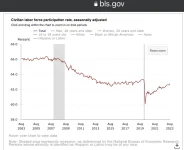I got ahead of myself and left out some of the point I was trying to make. If labor was really that tight, we would see average pay rising much faster, along with performance and longevity bonuses because when jobs are plenty and workers are few, businesses need more perks to lure their needed workforce away from whatever they’re doing today.
In a period of labor oversupply, wages fall because there are an excess of bodies for every opening, and those people simply want a job, even if the pay is lower.
We appear to be in a quandary, where “supposedly” labor is shorter than it has ever been, while wages are effectively shrinking. According to economists, this either should never happen, or should only be seen in short, transitory periods. Neither of those is panning out right now.

